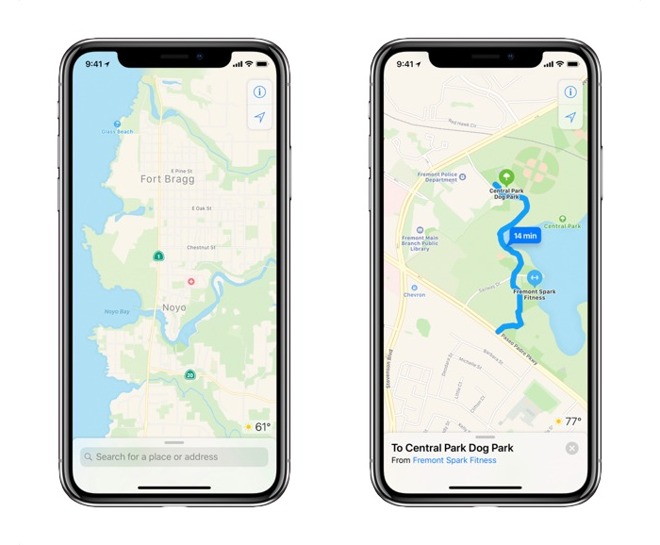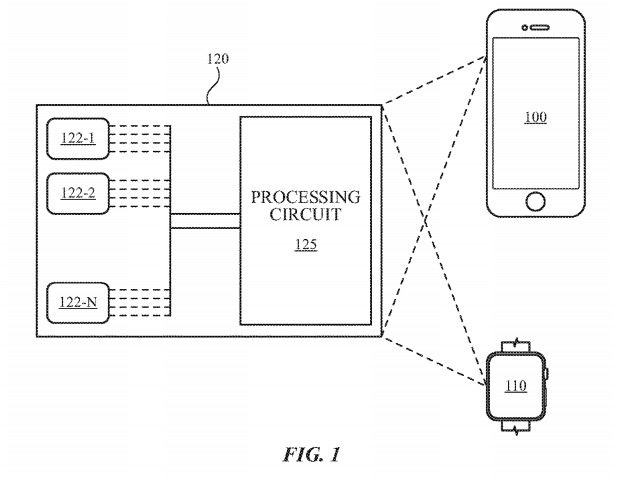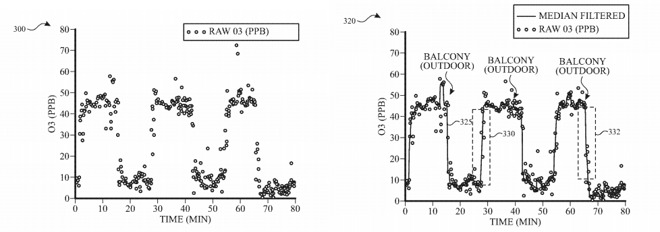Apple proposes simplified location detection using tiny gas sensors in iPhones
A future iPhone or Apple Watch could determine its general location by gases, Apple has proposed, with the use of miniature sensors inspecting the air to determine if the user is inside or outdoors, and potentially even narrowing down to a specific room, without relying on GPS or signals from communication networks.

Current location detection systems generally rely on the presence of electronic signals to narrow down a device's location. GPS signals can provide enough information for a mobile device to figure out its location, while the presence of known Wi-Fi and cellular networks, Bluetooth, NFC tags, and other elements can help assist where GPS is unavailable, such as indoors.
While these are useful, Apple notes that all of these require some level of existing infrastructure within range for a reading. In extreme cases where GPS is unavailable and there is no electronic signals nearby, such as at the bottom of a canyon or valley for example, other ways have to be produced.
In a patent application titled "Enhanced location detection using sensors integrated in electronic devices," Apple proposes the use of environmental sensors capable of detecting gases in the air. These sensors would be able to pick up ozone, carbon dioxide, and other similar emissions, to get a sense of the general area the device is located within.

A suggested gas-sensing system that could be included in the Apple Watch or iPhone
While it cannot give a precise identification of a new area it has yet to have been introduced to, such a system would be able to tell if a user is in one of multiple already known locations, based on the gas it can detect. In effect, for an indoor environment with different windows and entranceways, it could suggest which room the user is located.
Variations can also determine if the user is indoors or not, by the presence of tropospheric ozone, with a visit to a balcony outside providing different readings to that of an indoor environment.
The sensors themselves would be incorporated within the mobile device, and could use technologies involving optical, electrochemical and chemo-resistive technologies. It could even take the form of a "multi-pixel gas sensor," an array of sensors tuned to detect a particular gas type.

An example of how data could be filtered to determine the device's presence in a known location.
The existence of a patent application is not a guarantee that Apple will use the concept in a future product, but it does indicate areas where Apple has conducted research and where it is interested in working within.
Gas detection on mobile devices has cropped up in patent applications a few times, but not in an application relating to location detection. The two others from 2019 have more pedestrian uses for such technologies.
In January, Apple posited the idea of including "chemically robust miniature gas sensors" to its devices, as well as Internet of Things products that could connect to HomeKit, to sense the air for potentially hazardous items like carbon monoxide. Apple's solution to a problem of accuracy raised in the filing involved the use of a silicon-based substrate, adsorbent layers to filter the air, and heating elements to refresh the components.
Another sensor-based pair of patent applications from early April explained ways to detect air pollution and a variety of other gases in the air, including the ability to "smell" the air by detecting combinations of chemicals. Interestingly one filing suggested it could be used for spoiled food detection, body odor, and other "health applications," including determining a user's blood sugar levels in a user's sweat, enabling glucose monitoring without relying on direct contact or an embedded sensor in the user's skin.

Current location detection systems generally rely on the presence of electronic signals to narrow down a device's location. GPS signals can provide enough information for a mobile device to figure out its location, while the presence of known Wi-Fi and cellular networks, Bluetooth, NFC tags, and other elements can help assist where GPS is unavailable, such as indoors.
While these are useful, Apple notes that all of these require some level of existing infrastructure within range for a reading. In extreme cases where GPS is unavailable and there is no electronic signals nearby, such as at the bottom of a canyon or valley for example, other ways have to be produced.
In a patent application titled "Enhanced location detection using sensors integrated in electronic devices," Apple proposes the use of environmental sensors capable of detecting gases in the air. These sensors would be able to pick up ozone, carbon dioxide, and other similar emissions, to get a sense of the general area the device is located within.

A suggested gas-sensing system that could be included in the Apple Watch or iPhone
While it cannot give a precise identification of a new area it has yet to have been introduced to, such a system would be able to tell if a user is in one of multiple already known locations, based on the gas it can detect. In effect, for an indoor environment with different windows and entranceways, it could suggest which room the user is located.
Variations can also determine if the user is indoors or not, by the presence of tropospheric ozone, with a visit to a balcony outside providing different readings to that of an indoor environment.
The sensors themselves would be incorporated within the mobile device, and could use technologies involving optical, electrochemical and chemo-resistive technologies. It could even take the form of a "multi-pixel gas sensor," an array of sensors tuned to detect a particular gas type.

An example of how data could be filtered to determine the device's presence in a known location.
The existence of a patent application is not a guarantee that Apple will use the concept in a future product, but it does indicate areas where Apple has conducted research and where it is interested in working within.
Gas detection on mobile devices has cropped up in patent applications a few times, but not in an application relating to location detection. The two others from 2019 have more pedestrian uses for such technologies.
In January, Apple posited the idea of including "chemically robust miniature gas sensors" to its devices, as well as Internet of Things products that could connect to HomeKit, to sense the air for potentially hazardous items like carbon monoxide. Apple's solution to a problem of accuracy raised in the filing involved the use of a silicon-based substrate, adsorbent layers to filter the air, and heating elements to refresh the components.
Another sensor-based pair of patent applications from early April explained ways to detect air pollution and a variety of other gases in the air, including the ability to "smell" the air by detecting combinations of chemicals. Interestingly one filing suggested it could be used for spoiled food detection, body odor, and other "health applications," including determining a user's blood sugar levels in a user's sweat, enabling glucose monitoring without relying on direct contact or an embedded sensor in the user's skin.

Comments
I imagine the applications both on a fitness level as well as on a HomeKit level of a sensor capable of monitoring air quality and, at the same time, provide feedback on your activities based on it, would be really interesting.
No thanks Apple...
+ 1 to creepy/intrusive/unnecessary tech